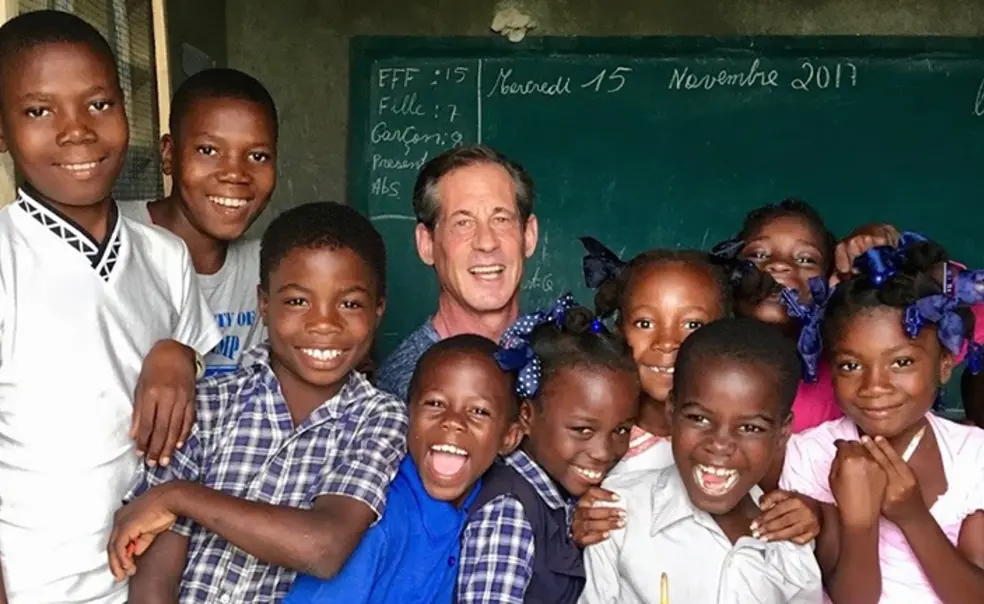Jeremy Hubball ’69 Is Helping Children, One Village at a Time
‘We may be doing this totally on our own, but let’s see what we can do’
When Jeremy Hubball ’69 co-founded the nonprofit Children’s Initiative in 2005, he didn’t have a plan — only inspiration. A few years earlier he had taken a long-distance bike ride in Vietnam and returned interested in the country and eager to help out.
In a way it was like 1994, when Hubball climbed Mount Everest with the Sagarmatha Environmental Expedition and wanted to do something about the trash and debris building up on the mountain. He didn’t really know how, but he jumped in anyway. A group of concerned climbers joined forces and were able to push the government to restrict traffic and start cleaning up the site, he says.
“I think we got so much done by just this loose affiliation of folks deciding to do something, that it probably was an inspiration for when I founded TCI,” Hubball says. “We may not have any organization, we may not have any source of funds in particular, we may be doing this totally on our own, but let’s see what we can do.”
Over 16 years, the Children’s Initiative has brought everything from schools to water infrastructure to rural and poor locales in Vietnam, Ethiopia, Honduras, and Haiti. Hubball says it started small, over beers with his high school friend Charlie Miller, an educator who had some connections in a remote Vietnamese village. Hubball, the son of a school headmaster, also had experience in education from teaching for four years after Princeton.
Initially they thought the community needed an orphanage, then discovered it really needed help with schools. As they got to work, they discovered water issues, so they started water purification and deworming programs as well. TCI has kept following that pattern of listening to and trusting the locals, Hubball says.
“Where could we work with folks to realize their dreams, not our dreams? Because we don’t know what the people in Vietnam or Ethiopia or Honduras or Haiti need. They do,” he says. “But to do that you have to find certain ingredients, work in small places. You have to work closely with the village elders and with the parents.”
For example, in Haiti, TCI built and runs an elementary school. When a local medical student returned home, the organization built him a clinic. Now he cares for 3,500 people.
Hubball has four children and spent a large part of his professional career working with Robert Danziger — “the most decent, fair and inclusive person I’ve ever known” — to build the Northland Investment Corporation. He’s proud of the company’s collaborative culture, something he says was rare in the commercial real estate industry when he began.
For his next challenge, Hubball is painting: He recently enrolled in a master’s in fine arts program at the Savannah College of Art and Design (SCAD), hoping it makes him “a better artist and a better person.” Keeping up with the technology and younger students who’ve already studied art has been challenging but fun, he says.
And he’s working on succession planning for TCI, for what happens the day he and Miller can no longer trek around the world.
“We want this work to continue long after we’re gone,” Hubball says.












1 Response
Jesse S. Okie ’69
3 Years AgoHelping Those in Need With What They Need
Jeremy, I am impressed and inspired by your charity work, particularly the Children’s Initiative, which I just read about on a Princeton class website (which I very seldom look at). Ever since spending two years in Ghana with the Peace Corps and two more years in Ivory Coast with the UN, I have contributed to various charities focused on Africa. In particular, I have supported an organization founded by Tom Warth and based here in St. Paul, Books for Africa, which does just what the name says. I would love to add Children’s Initiative to the international organizations to which my wife Mary and I contribute regularly. Good work!
We did not know each other well, but I remember you from our freshman year in Brown. I roomed there with Heinz Schmidt and Chip Roh .